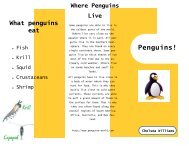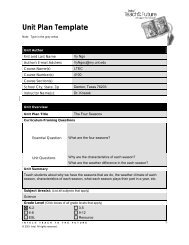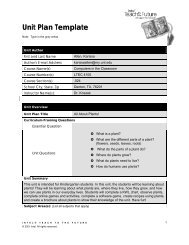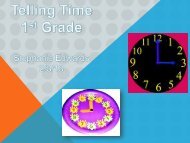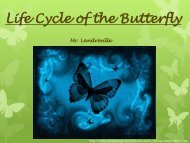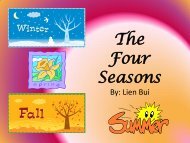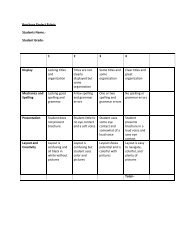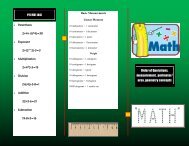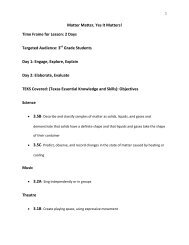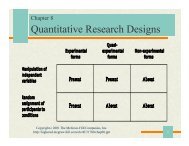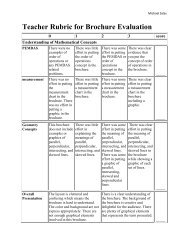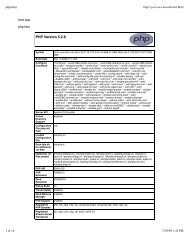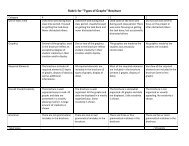The Water Cycle
The Water Cycle
The Water Cycle
You also want an ePaper? Increase the reach of your titles
YUMPU automatically turns print PDFs into web optimized ePapers that Google loves.
Everywhere<br />
Everything third grading-ly possible about<br />
WATER<br />
Delvanique Turner
Delvanique Turner<br />
Essential<br />
Questions…<br />
1. What is water?<br />
2. How old is water?<br />
3. Where can it be found?<br />
4. How much water is in the world?
1, Is water a requirement of life?<br />
2. What is the water cycle?<br />
3. How long is the water cycle?<br />
4. What are the phases of water?<br />
5. What would happen in a world<br />
without water?<br />
…Unit Question…
D<br />
o<br />
D<br />
E<br />
A<br />
Department of Defense Education Activity<br />
3Sc.5:<br />
Illustrate Earth’s saltwater and freshwater<br />
features (including oceans, seas, rivers, lakes,<br />
ponds, streams, and glaciers).<br />
3Sd.2:<br />
Explain how water and other substances change<br />
from one state to another(including melting,<br />
freezing, condensing, boiling, and evaporating).<br />
3E2a.2:<br />
Discuss ideas for writing, use diagrams and charts<br />
to develop ideas, and make a list or notebook of<br />
ideas.<br />
S<br />
T<br />
A<br />
N<br />
D<br />
A<br />
R<br />
D<br />
S<br />
Delvanique Turner
T<br />
E<br />
K<br />
S<br />
Third grade serves as a review from the<br />
previous three years; all water related<br />
science TEK include Kindergarten to<br />
Third grade.<br />
• K. A<br />
- Observe and describe properties of rocks, soil and<br />
water<br />
• 2.8C<br />
- Observe and describe properties of rocks, soil, and<br />
water.<br />
• 2.10 A<br />
- Describe and illustrate the water cycle<br />
• 3.7B<br />
- Identify matter as liquids, solids, gases<br />
• 3.11A<br />
- Identify and describe the importance of earth<br />
materials including water and classify it as renewable,<br />
nonrenewable, or inexhaustible resources.
<strong>The</strong> student will be able to:<br />
– Define water<br />
– Discuss the importance of water<br />
– List and recognize water in its different<br />
phases<br />
– Illustrate and define the components of the<br />
water cycle<br />
– compare and contrast life in a world with<br />
and without water<br />
Bloom Taxonomy
Delvanique Turner<br />
Individual<br />
• Students will read the required text<br />
• <strong>The</strong> students will complete worksheets from the<br />
reading material.<br />
– Worksheets will contain:<br />
• Definitions<br />
• Fill in the Blank<br />
• Word Search<br />
• Critical Thinking (Short Answers)
Group<br />
<strong>The</strong> class will be divided<br />
in to two groups; one<br />
group will the world in<br />
its current state,<br />
whereas the other will<br />
be the world without<br />
water.<br />
This lesson is to teach<br />
the importance of water<br />
and water conservation<br />
for the future.<br />
Delvanique Turner
Delvanique Turner<br />
Studies have shown<br />
children retain more<br />
information from the<br />
constructivist approach<br />
in regards to learning.<br />
Constructivist Approach



